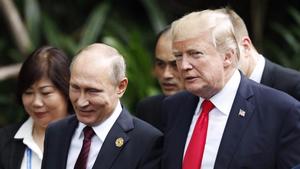 US President Donald Trump (right) and Russia's President Vladimir Putin walk together to take part in the "family photo" during the Asia-Pacific Economic Cooperation (APEC) leaders' summit in the central Vietnamese city of Danang on Nov 11, 2017.
(JORGE SILVA / POOL / AFP)
US President Donald Trump (right) and Russia's President Vladimir Putin walk together to take part in the "family photo" during the Asia-Pacific Economic Cooperation (APEC) leaders' summit in the central Vietnamese city of Danang on Nov 11, 2017.
(JORGE SILVA / POOL / AFP)
WASHINGTON - US President Donald Trump and his Russian counterpart Vladimir Putin on Thursday discussed issues of COVID-19 and arms control during a phone conversation, White House spokesman Judd Deere said in a statement.
READ MORE: Kremlin: Putin 'supports dialogue' after proposed G7 invite
President Trump reiterated his hope of avoiding an expensive three-way arms race between China, Russia, and the United States and looked forward to progress on upcoming arms control negotiations in Vienna.
Judd Deere, spokesman, White House
The two leaders discussed efforts to defeat the coronavirus pandemic while continuing to reopen global economies, said the statement.
"President Trump reiterated his hope of avoiding an expensive three-way arms race between China, Russia, and the United States and looked forward to progress on upcoming arms control negotiations in Vienna," it added.
Earlier this month, Fu Cong, director-general of the arms control department of the Chinese Foreign Ministry, made it clear that it is unrealistic to expect China to join US-Russia negotiations on nuclear arms reduction, given the huge gap between Chinese and US nuclear arsenals in terms of quantity and sophistication.
The United States and Russia had consultations on arms control and strategic stability in Vienna last month, with no tangible progress made on the extension of the New Strategic Arms Reduction Treaty (New START).
In 2010, Washington and Moscow signed the New START, which stipulates the limits to the numbers of deployed nuclear warheads and strategic delivery systems by both. The New START, the last remaining nuclear arms control treaty in force between the two nuclear superpowers, will expire on Feb 5, 2021.
ALSO READ: Putin tells Trump in New Year's letter he's open to meeting
The agreement can be extended for at most five years with the consent of the two countries. Russia has expressed willingness to extend the treaty, while the Trump administration has yet to officially reply.


